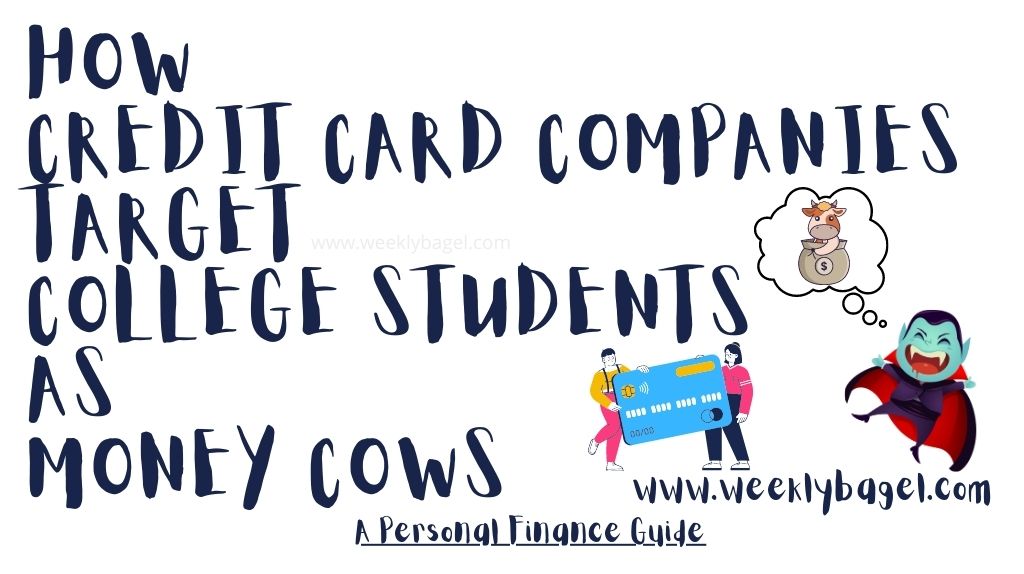
Credit card companies target college students as money cows. Although there are benefits of college students having a credit card, the cons are disheartening. This is to be discussed later in this article. What do I mean by this statement?
There is this fallacy of people paying with credit cards being richer than the average people. For a college student, a credit card projects financial stability and independence to peers. Although this is not the case, since the average student may be working, but not making enough to keep up with the inflation rate.
This is especially with their full time classes and class schedules. These do not allow much flexibility for full time work. Credit card companies know that. Hence, why college students are one of the best target audience for credit cards.
Here are more reasons for why college students are such a good target for credit card companies.
Why Do Credit Card Companies Target College Students
Besides the fact most independent college students are barely making ends meet in colleges, here are some other reasons why they are a good target audience for credit cards.
- They have a great future ahead of them. Most will graduate to have a good paying job.
- Most college students are working, but they barely make end meets. According to a 2015 Ohio State University survey, 73% percent of college students struggle financially. Therefore, a credit card appears to be a promising insurance for financial emergencies.
- They are in their youthful glee period with great appetite for consuming products. By youthful glee, I mean they are at the stage in their lives where material acquisition, peer-pressure and social approval matter a lot. As a result, they will not mind spending a lot to meet these demands.
- Some young college students are less likely to manage their credit cards. This is because of financial illiteracy and naivety. These are two factors which could contribute to increasing credit card debt. An increase in debt means monthly profits for any credit card company involved.
- Young working class adults in colleges are at the stage of building their credit history. This is actually one of the benefits of college students having a credit card.
Looking at the above reasons, is having credit cards smart for college students?
Yes, but it has to be credit cards made for students. Those made for the sole purpose of helping college students build their credit history. Of course, this is while providing them access to limited cash. Otherwise, students are gouged into being money cows for credit card companies with serious malpractices.
Speaking of college students being money cows for some credit card companies, here are the strategies used to trap students into a position of continuous monthly payments.
How Credit Card Companies Target College Students
Credit card companies attract customers through incentives.
With access to credit data and surveys, credit card companies know exactly their target audience. They structure their marketing in a way which meets the needs of their intended customers. To achieve this end, here are the kinds of tactics credit card companies use to sign up customers:
1. Credit Card Rewards
Credit card companies ply their cards as a means to earn rewards for spending. This is often in the form of a discount by the company. Simply put, you can accumulate enough points to save on some future expenditures.
Usually, there are three types of credit card rewards. You have the point, miles and cash back rewards. Credit card companies will offer you points the more you spend. Or, they would give you a little cash back for every expenditure limit. Otherwise, it adds to travel discount in the form of airline ticket or travel expense discount.
Examples of such credit card reward programs include rewards for gas expenditures, rental discount, plane tickets and other forms of spending. Additionally, some credit cards are created specifically to cater to these expenditures with the intention of accumulating points. Some notable ones you may be familiar with include gas credit cards or shopping credit cards.
The major perk to most of these credit cards, is the more you spend the more you earn rewards. Yes- credit card rewards make you spend more. For the average college student, this may be a bad idea. This is because the average college student income is not enough to offset any resulting accumulating debt from spending more to earn rewards.
2. Low Introductory Fixed Rates
This is the biggest credit card trap for most people. It is part of how credit card companies use college students as money cows. Some credit card companies will throw in this grammar to their target audience without further explanation of what introductory fixed rates means.
What most young working adults are not told, is introductory fixed rates means you will pay a flat interest rate on your credit debt for a short time. After the time period, your interest rate can vary as much as the credit card company is allowed to do.
Here is an example.
Let us say a college student was promised an introductory fixed interest rate of 5% for three months. If his or her credit debt was $500 within the time period, he or she will end up paying $25 in interest. A flat 5% interest rate sounds great, when one is not told it could change to a variable 25% interest rate after three months.
At the rate of 25%, a student ends up paying $125 in interest fees. This interest rate continues to be adjusted with any missed payment. When credit card companies offer attractive low introductory rates, be sure to inquire how long it would last.
3. No Maintenance Fees
Just because a credit card company says there is no maintenance fee does not mean there may not be hidden fees. The hidden charges in credit cards include:
- late payment fees
- max-out fees
- annual fees
- balance transfer fee
- Convienence fee
I call them- credit card traps.
This is because these may not be explained to the typical college student who is in a rush to get his or her hands on a credit card. Some credit card companies have the tendency not to advise on what not to do with your credit card after getting one. This is because the majority of the fees charged on a credit card comes from these avoidable mistakes.
These fees add to their monthly profits, do they not?
Also, there are other fees referred to as junk fees. This is because they may not be explained to you- the college student, during application. They just pop out of nowhere during the course of the credit card ownership.
By the way, a good example of a junk fee is a convenience fee. Some credit card companies will charge you for processing transactions on your credit card under this term. It sounds like ridiculous, does it not?
On the whole, credit card companies targeting college students use these incentives to sign them up. Not that any of these credit card offers are bad in short term, but the typical college student needs to be aware of them to avoid being a long term money cow for these companies. Otherwise, these guys will milk you dry, since most are out to generate profit.
4. Minimum Monthly Payment
Most credit card companies offer minimum balance as a way of making their credit cards attractive to students. However, some fail to mention you do not get to choose the minimum balance. A minimum balance does not mean you get to pay the lowest amount you want monthly.
Credit card companies choose it for you.
In addition to this fact, these companies do not mention that the minimum balance promised means a customer has to pay an increased interest rate as a result. Now, stop reading for a minute. Why do you think this is so?
Well, it is because knowing early about it may scare away students. Imagine it is explained to you prior to application, that you do not get to choose the minimum payment monthly, it will scare an already struggling student away. This is especially, when they learn it affects the interest rate too.
But yes, a minimum monthly payment is one of the credit card incentives used to get customers on campus. This is why credit cards thrive on college campuses. A promise of a minimum monthly payments means a student does not have to worry about paying a lot monthly for credit card debt.
Negative Effects Of Credit Cards On College Students
The most common credit card mistakes college students make, is not to do important research before getting a credit card. This is followed by the lack of patience to read through the terms and conditions of a credit card being offered by a credit card company.
Besides these two, there is the question of accumulating credit card debt as a result of number of credit cards owed by some college students. The U.S. Government Accountability Office study puts the percent of college students with at least one credit line as a third of college students. The study also reported 6 to 13 percent of college students use four or more credit cards.
This is bad, since it increases the risk of missing a payment and ruining one’s credit history. The last thing any student wants, is to graduate college with a ruined credit history. It is hard to qualify for any loan with a good interest rate with a ruined credit history.
Additionally, there are outrageous hidden charges on credit cards which issuers may not discuss with students. I have been a victim of such a practice. The debt you accumulate monthly from these hidden fees, makes it hard to pay off credit card debt. This is especially, when you are a college student.
And, guess what happens when you are unable to keep up with the increasing debt?
You basically become a money cow for your credit card issuer. They will charge you penalty fees for missed payments and interest on existing credit card debt. This will be done every month. You can read more about what happens when you stop paying your credit card debt to grasp the impact of the negative effects of credit cards.
How Many Credit Cards Should A College Student Have
One credit card is good enough. There is no need to have more than one, otherwise it increases your chances of having a maxed-out credit card. As a result, you will dig yourself so far into debt that most of your income will go into paying an ever increasing debt. This is what a credit card debt does; the interest on debt keeps adding to total debt monthly.
Whether you spend money on the credit cards or not, it does not stop accumulating until you pay off your debt. It is scary, is it not?
The U.S Government Accountability Office study discussed earlier, asked a few universities to report the negative effects of credit cards on their students. One school, which has a student body that retains a financial attorney, reported 255 students who came to seek advice had a credit card debt of $2100 to $39,000.
For any young working adult, this is a lot when you are trying to pay for rent, tuition and living expenses. Hence, why one credit card with limited cash is good enough. Having said that, college students should be wary of credit card companies offering to increase spending limit and the number of credit cards.
Just know the credit card issuers are not doing it out of the abundance of their selfless hearts.
How Can College Students Use Credit Cards Responsibly
On What Beginners Need To Know About Credit Cards article, I discussed the kind of credit cards best for young working class adults in colleges or the workforce. Here is a summary of what it is all about below.
First time credit cards for students should include low interest rate, cash backs or rewards, no maintenance fee, no annual fee and limited cash access. Prior to signing the application, I highly recommend you read the terms and conditions well before getting your first credit card. Ask questions relating to junk fees, to make sure they will not start popping up later.
Secondly, do not be shy to ask questions. It is going to save you from drowning in credit card debt later. If it sounds too good to be true, it is too good to be true. Also, walk away when whoever is signing you up for a credit card, does not have the patience to wait for you to read the terms and conditions.
As for using credit cards responsibly, be sure to only use it for little expenditures. This is especially things you can easily pay back by debt due dates. Try not to pay for big expenses like a car or house with your credit card. This is because the interest on such debts will be a lot.
You can always use a debit card for those expenses, since your debit card is connected to your bank account. If you cannot, then it means you cannot afford such an expense. There is nothing wrong with it. It just means you have to either save for the expense or forgo it.
To reiterate, some credit card companies prey on young working class adults, especially working college students. Be sure not to be one of the money cows, who satisfies this corporate greediness monthly.




 9 Gas Stations that Sell Money Orders Near You
9 Gas Stations that Sell Money Orders Near You